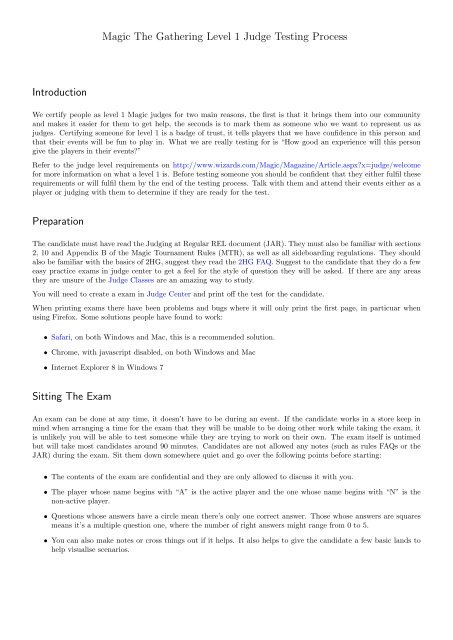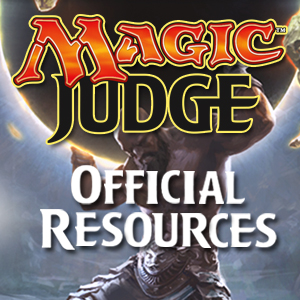To become a Magic the Gathering Judge, pass Level One Judge exam and attend conferences. Becoming a Magic the Gathering Judge involves passing the Level One Judge exam and actively participating in conferences and events to enhance your skills and knowledge in the game.
Magic the Gathering Judges play a crucial role in ensuring fair play and resolving disputes during tournaments. By becoming a certified Judge, you can contribute to the growth and integrity of the Magic the Gathering community while expanding your own understanding and expertise in the game.
This guide will outline the steps and requirements to help you embark on your journey to becoming a Magic the Gathering Judge.

Credit: judgeacademy.com
The Importance of Magic the Gathering Judges
Magic the Gathering is a complex and intricate game that requires skilled individuals to ensure fair play and conduct in tournaments. The role of a Magic the Gathering judge is crucial in maintaining the integrity of the game, resolving disputes, and upholding the rules and regulations of the tournament.
Role in Tournaments
Magic the Gathering judges play a pivotal role in overseeing and facilitating tournaments. They are responsible for maintaining the flow of the event, answering player inquiries, and ensuring that matches are conducted according to the game’s rules and guidelines. These dedicated individuals are instrumental in creating a positive and organized environment for players to compete in.
Ensuring Fair Play
One of the core responsibilities of Magic the Gathering judges is to ensure fair play among participants. This involves actively monitoring matches to prevent cheating, providing rulings on card interactions, and resolving any disputes that may arise during gameplay. The judges’ vigilant oversight contributes to the overall integrity and legitimacy of the tournament.

Credit: www.yumpu.com
Prerequisites for Becoming a Judge
Becoming a Magic the Gathering judge is an exciting and rewarding journey for any enthusiast of this popular trading card game. However, before you can embark on this path, there are certain prerequisites that you must meet. These prerequisites include having a strong understanding of the game’s mechanics, gaining valuable judging experience, and acquiring rules certification. Let’s take a closer look at each of these prerequisites:
Game Knowledge
In order to become a Magic the Gathering judge, it is essential to have a deep understanding of the game’s rules, mechanics, and card interactions. You should be familiar with the comprehensive rules as well as the specific rulings for different card sets. A solid grasp of timing and turn structure is also crucial, as judges often need to make quick and accurate decisions during matches. Keeping up with the latest card releases and rule updates is equally important to ensure you stay current and knowledgeable.
Building game knowledge can be achieved by actively playing Magic the Gathering and immersing yourself in the community. Dedicate time to studying the comprehensive rules and seeking clarification on any confusing aspects. Participating in local tournaments or game nights can provide valuable insight into the nuances of gameplay. Additionally, joining online forums and engaging with other players and judges can enhance your understanding and expand your knowledge base.
Judging Experience
While a strong game knowledge forms the foundation, gaining practical judging experience is vital to becoming a successful Magic the Gathering judge. It is recommended to start by volunteering at local events or participating in judge programs organized by your regional game store or community. These opportunities allow you to observe other experienced judges, learn from their expertise, and develop your own judging skills.
As you accumulate judging experience, focus on honing key skills such as impartiality, fairness, and effective communication. A good judge should be able to facilitate a smooth and enjoyable gaming experience for all players. Actively seek feedback and guidance from established judges to improve your performance. Remember, dedicated practice and a willingness to learn from mistakes will go a long way in refining your judging abilities.
Rules Certification
The final prerequisite for becoming a Magic the Gathering judge is obtaining rules certification. This certification demonstrates your comprehensive understanding of the game’s rules and ensures your competency as a judge. The first step is to pass the Rules Advisor Exam, which tests your foundational knowledge of the game.
Once you have successfully completed the Rules Advisor Exam, you can then progress to the level 1 judge certification. This involves attending a judge seminar and passing a written exam. Level 1 judges are qualified to officiate at Regular Rules Enforcement Level (REL) events. To advance further in your judging career, you can pursue higher-level certifications, such as level 2 and level 3, which enable you to judge more competitive and prestigious tournaments.
It is important to note that rules certification is an ongoing process, and judges are required to stay updated with rule changes and new sets released by Wizards of the Coast. Continuing education courses and online materials provided by the judge community can aid in this endeavor, ensuring that you remain a competent and knowledgeable judge throughout your career.
Also Read: How to Become a Kick Partner
Steps to Becoming a Certified Judge
Joining Judge Programs can be your first step towards becoming a Magic the Gathering Judge.
When it comes to Studying Tournament Rules, ensure you are familiar with the official rule documents.
Consider Taking the Judge Exam to officially become a certified Magic the Gathering Judge.
Gaining Practical Experience
Embark on the path to becoming a Magic the Gathering judge by gaining practical experience through live events. Hands-on learning opportunities in tournaments and competitions provide valuable insight into the intricate world of Magic the Gathering rules and regulations. Mastering the craft of judging enhances your skills and credibility within the Magic the Gathering community.
Volunteering at Tournaments
Participate in Magic the Gathering tournaments as a volunteer to gain hands-on experience.
- Assist players with rules and tournament procedures at events.
- Learn critical skills by observing experienced judges in action.
Shadowing Experienced Judges
Shadow a seasoned Magic the Gathering judge to learn from their expertise.
- Observe how they handle unique situations during game play.
- Ask questions and seek advice to enhance your judging skills.
Building a Positive Reputation
Building a positive reputation is crucial for aspiring Magic the Gathering judges. Your reputation will not only determine your chances of becoming a judge, but also your success and growth in the Magic the Gathering community. In this section, we will explore two key aspects of building a positive reputation: maintaining professionalism and receiving endorsements.
Maintaining Professionalism
Being a Magic the Gathering judge requires a high level of professionalism. To maintain this professionalism:
- Stay updated: Keep yourself updated with the latest rules, policies, and developments in the Magic the Gathering community. This will demonstrate your commitment and dedication to the game.
- Communicate effectively: Clear and concise communication is essential for a judge. Always be open and approachable, providing explanations and insights in a polite and respectful manner.
- Show consistency: Be consistent in enforcing the rules and policies without favoritism. Fair and unbiased decisions will earn you the trust and respect of players, organizers, and fellow judges.
- Continuously improve: Strive for self-improvement by seeking feedback and learning from experiences. Reflect on your judgments and make necessary adjustments to enhance your skills as a judge.
Receiving Endorsements
Endorsements from respected members of the Magic the Gathering community can significantly boost your reputation as a judge. To receive endorsements:
- Volunteer at events: Gain valuable experience by volunteering at local game stores, tournaments, or conventions. This not only allows you to develop your judging skills but also gives you the opportunity to network with other community members.
- Build a network: Cultivate connections with experienced judges, event organizers, and players. Participate in forums or social media groups related to Magic the Gathering to engage with the community and showcase your knowledge and commitment to the game.
- Participate in judge certification programs: Enroll in official judge certification programs offered by Wizards of the Coast. These programs provide structured training and evaluation, giving you official recognition and increasing your chances of receiving endorsements.
- Seek mentorship: Find a mentor who can guide you in your journey to becoming a Magic the Gathering judge. A mentor can offer valuable advice, share insights, and help connect you with potential endorsers within the community.
By maintaining professionalism and receiving endorsements, you can build a positive reputation that sets you on the path to becoming a successful and respected Magic the Gathering judge.

Credit: blogs.magicjudges.org
Advancing in Judge Levels
Advancing in judge levels is an important part of a Magic the Gathering judge’s journey. As judges gain experience and improve their knowledge and skills, they have the opportunity to progress through different certification levels. Each level offers new challenges, responsibilities, and opportunities for personal and professional growth.
Level 1 Certification
A Level 1 judge certification is the starting point for those interested in pursuing a career as a Magic the Gathering judge. Candidates for this level must demonstrate a basic understanding of the game’s rules and mechanics, as well as the ability to effectively manage small-scale events such as local tournaments and Friday Night Magic. Upon passing the Level 1 exam and meeting other requirements, candidates will receive their certification.
Level 2 Certification
Achieving a Level 2 certification represents a significant step in a judge’s career. Aspiring judges seek this level must have a strong dedication to learning and grow beyond their current capabilities. Level 2 judges are expected to mentor and instruct Level 1 judges, oversee larger events, and demonstrate a deeper understanding of tournament operations and rulings. They must also pass the Level 2 exam and meet the specified eligibility criteria.
Level 3 Certification
Attaining Level 3 certification is a testament to a judge’s exceptional capabilities and dedication. Level 3 judges are recognized as leaders in the Magic the Gathering community, often serving as regional coordinators, official judges for premier events, and mentors for Level 1 and Level 2 judges. Their role is vital in shaping the judge program and ensuring a high level of professionalism and integrity. Becoming a Level 3 judge involves a rigorous evaluation process and demonstration of exemplary leadership and knowledge in the field.
Dealing with Challenges
Dealing with challenges is an essential part of being a Magic the Gathering judge. From handling disputes between players to maintaining neutrality, judges must navigate various obstacles with professionalism and fairness.
Handling Disputes
When disputes arise during a Magic the Gathering game, judges must step in to resolve the issue quickly and impartially. The following steps can help judges effectively manage conflicts:
- Listen to both players to understand the nature of the disagreement.
- Remain calm and objective to avoid escalating tensions.
- Consult the official Magic the Gathering rules and guidelines to make an informed decision.
- Communicate the resolution clearly to the players and ensure they understand the outcome.
Maintaining Neutrality
Neutrality is crucial for judges to uphold the integrity of the game and ensure fair play. To maintain neutrality, judges should:
- Avoid showing favoritism towards any player or making assumptions based on personal biases.
- Focus on the facts and rules when making judgments, regardless of personal opinions.
- Treat all players with respect and fairness, regardless of their skill level or reputation.
Benefits of Being a Magic the Gathering Judge
Becoming a Magic the Gathering Judge comes with a host of benefits that go beyond simply enjoying the game. Whether you’re a dedicated player or just interested in learning more about the game, being a judge can be a rewarding experience. From community recognition to opportunities for personal growth, here are some of the key advantages:
Community Recognition
As a Magic the Gathering Judge, you become an integral part of the game’s community. Your role as a judge demonstrates your expertise and commitment to fair play, earning you respect and recognition from players and fellow judges alike. By being an authoritative figure in the game, you gain the trust of the community, and players will turn to you to resolve disputes or provide insights into rules and strategies.
Opportunities for Growth
Being a Magic the Gathering Judge opens up a world of growth opportunities. Through judging tournaments and events, you’ll not only improve your knowledge of the game, but also hone important skills such as problem-solving, decision-making, and communication. The role of a judge involves maintaining a calm and fair environment, which helps develop your leadership abilities and builds your self-confidence. Additionally, being a judge allows you to network with other passionate individuals, such as players, organizers, and fellow judges, expanding your connections within the Magic community.
Conclusion
Becoming a Magic the Gathering Judge is an exciting opportunity for those passionate about the game. By following the steps outlined in this guide, you can embark on a journey towards becoming a certified judge. Remember to attend events, study the rules, and gain practical experience to enhance your understanding.
With dedication and perseverance, you can thrive in this role, enjoy the Magic community, and contribute to the growth of the game.
